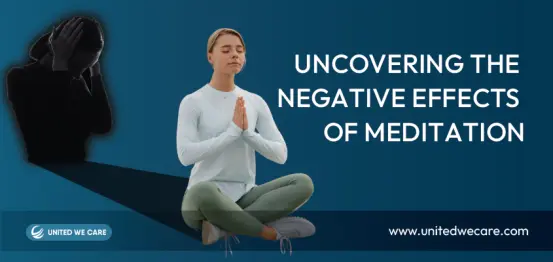Introduction
If you are alive today, chances are someone around you has asked you to try meditation. If not, then some advertisements or programs might have recently talked about how great meditation and mindfulness are. And they are definitely correct in their advocacy because even researchers have found that such mindfulness interventions are great tools to promote relaxation and overall well-being. However, what many of these advocates miss is that these tools are not always positive. Sometimes, they push you to a state of conflict and emotional turmoil. Meditation can have a dark side, and in this article, we are going to talk about exactly that.
What are the Negative Effects of Meditation?
In the past few decades, the popularity of mindfulness-based interventions and meditation has increased a lot. From doctors and psychologists to healers and motivational speakers, all advise you to meditate. But it is highly possible that for some people, this intervention becomes more negative than positive. In research, experts have found that mindfulness may lead to anxiety, depression, disillusionment, and loss of meaning in life for the meditators [1]. In other words, for a person who enters the field of meditation without a guide, this can have severe consequences.
Those who study this phenomena or are aware of it call it the “dark night” or “the dark night of the soul.” [2]. Not everyone experiences this “dark night” the same way. Some experience minute distress while others can experience significant negative phenomena [3]. Commonly, adverse effects of meditation include [1] [2] [3] [4]:
- Increased anxiety, Fear, and Paranoia: Some individuals may experience increased fear and paranoia during or after meditation. When we meditate, the awareness on internal thoughts and sensations increase and the filters we usually keep to stop fears and worries reduce. When this happens, we might feel as if something unresolved has come up all of a sudden and it can become potentially triggering.
- Depressive Symptoms: In some instances, especially when some negative feelings were present beforehand, meditation can intensify feelings of sadness and hopelessness. In other words, either depressive symptoms can increase or the attention towards these depressive symptoms can increase.
- Loneliness: Engaging in deep introspection and self-reflection during meditation can make individuals more aware of their solitude or lack of social connections. Once again, the increase in awareness of these feelings can lead to an increase in the feelings themselves.
- Feelings of Meaninglessness in Life: As individuals delve into the depths of their consciousness, they may confront existential dilemmas or grapple with life’s inherent ambiguity and uncertainty, which can temporarily lead to a sense of purposelessness.
- Unpleasant Memories of the Past: During meditation, individuals may encounter unpleasant memories or traumatic experiences from their past. Mindfulness and awareness can bring buried memories to the forefront of consciousness, resulting in emotional distress, flashbacks, or vivid recollections.
- Dissociation from reality: In some cases, individuals may become so absorbed in meditation that they detach from their surroundings or even their sense of self.
- Triggering of Psychological Issues: For individuals with preexisting psychological conditions, meditation can potentially trigger or worsen symptoms. Self-exploration, even in therapy, needs someone to contain it and stop it before it consumes the person. Un-monitored self-exploration can lead to triggering of unresolved issues and traumas that can worsen the psychological symptoms.
In some extreme situations, meditation has also triggered psychotic episodes in individuals with a previous history of disorders like Schizophrenia [5]. Additionally, when researchers studied the effect of mindfulness on criminals, there was some increase in criminogenic thoughts among inmates [6].
Why Does Meditation Become Negative?
Meditation in its current state is highly Westernized and touted as having only beneficial effects. However, the dark side of meditation is well recognized in the Eastern religious practices of Hinduism and Buddhism [2]. There are many reasons for meditation to turn negative. These include [1] [2] [3] [7]:
- Absence of a spiritual component: Many authors believe that various companies are increasingly marketing meditation as a commodity instead of a spiritual practice. Eastern traditions strongly associate meditation with spiritual elements and newer perspectives on the world. Without this component, many individuals struggle to experience the positive benefits and get distressed by the challenges that arise.
- Choosing Wrong Technique: Meditation techniques are diverse, and what works for one person may not be suitable for another. When you choose some technique without proper guidance or without the knowledge of its outcomes, it can have negative effects on you.
- Lack of Proper Guidance: Many individuals begin practicing meditation by themselves. Without proper guidance and instruction, individuals may not fully understand how to navigate their meditation practice or the side effects it may produce.
- Issues With Teacher or Trainer: In many institutions, mindfulness training is not well-regulated. The trainer may thus be unaware of the nuances of meditation and mental health. They may also provide goals incompatible with the person’s needs, and the overall experience may become negative.
- Unresolved Psychological Issues: Meditation can bring to the surface underlying psychological issues that the practitioner has not adequately addressed. If individuals have unresolved trauma, anxiety disorders, or other mental health conditions, meditation can exacerbate these issues rather than alleviate them.
How do you overcome the Negative Effects of Meditation?
Even with the knowledge that for some people, this can be a negative intervention, no one can discount the positive benefits meditation can have. In light of this, it is a good thing that you can tackle the dark side of meditation. Some tips for doing so are [1] [2] [8]:
- Seek Guidance from a Qualified Instructor: To ensure a safe and beneficial practice, it is advisable to seek guidance from an instructor who is qualified. They are experts in determining what will work for you and when things are getting bad. They can offer support and guidance and lead you to positive side of meditation if you get stuck in the dark night.
- Practice Self-Compassion and Self-Care: If adverse effects emerge during meditation, it is essential to be gentle with oneself and practice self-compassion. Taking care of oneself through activities like eating healthily, getting sufficient sleep, and participating in enjoyable and relaxing activities can bring balance and minimize negative impacts.
- Consider Alternative Practices: If meditation consistently produces negative effects, alternative stress reduction and mindfulness practices may be worth exploring. For instance, you can explore a more movement-oriented practice like yoga or tai chi, as they also offer benefits similar to meditation.
Read more about-The dark side of substance use
Conclusion
When people start their journey of meditation, they expect that it will be a big positive step, but they are unaware that sometimes it is full of challenges that might make them face their fears. This is especially true for people who have unresolved emotional issues from the past and enter this area without proper supervision and guidance. Nonetheless, it is possible to navigate these issues and continue your journey of well-being.
If you need guidance around mindfulness and meditation, contact the experts at United We Care. Our skilled facilitators can help you learn meditation and overcome any obstacles that may arise. Furthermore, you can participate in our Healing with Meditation wellness program to improve your knowledge and skill in this practice.
References
- J. P. Dudeja, “Dark Side of the Meditation: How to Dispel this Darkness,” Journal of Emerging Technologies and Innovative Research, vol. 6, no. 8, 2019. Accessed: Jul. 10, 2023. [Online]. Available: https://www.researchgate.net/profile/Jai-Dudeja/publication/335365372_Dark_Side_of_the_Meditation_How_to_Dispel_this_Darkness/links/5d6004d8299bf1f70b075429/Dark-Side-of-the-Meditation-How-to-Dispel-this-Darkness.pdf
- A. LUTKAJTIS, Dark Side of Dharma: Meditation, Madness and Other Maladies on The Contemplative Path. S.l.: STYLUS PUBLISHING, 2021.
- S. P. Hall, “Being mindful about mindfulness: Exploring the dark side,” International Journal of Coercion, Abuse, and Manipulation, vol. 1, no. 1, pp. 17–28, 2020. doi:10.54208/ooo1/1001
- A. Cebolla, M. Demarzo, P. Martins, J. Soler, and J. Garcia-Campayo, “Unwanted effects: Is there a negative side of meditation? A multicentre survey,” PLOS ONE, vol. 12, no. 9, 2017. doi:10.1371/journal.pone.0183137
- R. N. Walsh and L. Roche, “Precipitation of acute psychotic episodes by intensive meditation in individuals with a history of schizophrenia,” American Journal of Psychiatry, vol. 136, no. 8, pp. 1085–1086, 1979. doi:10.1176/ajp.136.8.1085
- J. P. Tangney, A. E. Dobbins, J. B. Stuewig, and S. W. Schrader, “Is there a dark side to mindfulness? relation of mindfulness to Criminogenic Cognitions,” Personality and Social Psychology Bulletin, vol. 43, no. 10, pp. 1415–1426, 2017. doi:10.1177/0146167217717243
- K. Rosing and N. Baumann, The dark side of mindfulness why mindfulness interventions are not …, http://www.evidence-based-entrepreneurship.com/content/publications/407.pdf (accessed Jul. 10, 2023).
- J. Valdivia, “The dark side of meditation,” Medium, https://medium.com/curious/the-dark-side-of-meditation-a8d83a4ae8d7 (accessed Jul. 10, 2023).









